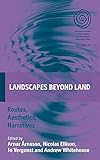Landscapes Beyond Land : Routes, Aesthetics, Narratives / ed. by Arnar Árnason, Andrew Whitehouse, Jo Vergunst, Nicolas Ellison.
Material type: TextSeries: EASA Series ; 19Publisher: New York ; Oxford : Berghahn Books, [2012]Copyright date: ©2012Description: 1 online resource (228 p.)Content type:
TextSeries: EASA Series ; 19Publisher: New York ; Oxford : Berghahn Books, [2012]Copyright date: ©2012Description: 1 online resource (228 p.)Content type: - 9780857456717
- 9780857456724
- 304.23 23
- online - DeGruyter
| Item type | Current library | Call number | URL | Status | Notes | Barcode | |
|---|---|---|---|---|---|---|---|
 eBook
eBook
|
Biblioteca "Angelicum" Pont. Univ. S.Tommaso d'Aquino Nuvola online | online - DeGruyter (Browse shelf(Opens below)) | Online access | Not for loan (Accesso limitato) | Accesso per gli utenti autorizzati / Access for authorized users | (dgr)9780857456724 |
Frontmatter -- Contents -- Figures -- Preface and Acknowledgements -- Introduction: Landscapes beyond Land -- 1 Walking the Past in the Present -- 2 ‘A Painter’s Eye Is Just a Way of Looking at the World’ Botanic Artist Roger Banks -- 3 Encountering Glaciers: Two Centuries of Stories from the Saint Elias Mountains, Northwestern North America -- 4 Fences, Pathways and a Peripatetic Sense of Community: Kinship and Residence amongst the Nivaclé of the Paraguayan Chaco -- 5 Elements of an Amerindian Landscape: The Arizona Hopi -- 6 Thalloo My Vea: Narrating the Landscapes of Life in the Isle of Man -- 7 Cairns in the Landscape: Migrant Stones and Migrant Stories in Scotland and its Diaspora -- 8 Beholding the Speckled Salmon: Folk Liturgies and Narratives of Ireland’s Holy Wells -- 9 How the Land Should Be: Narrating Progress on Farms in Islay, Scotland -- 10 Visible Relations and Invisible Realms: Speech, Materiality and Two Manggarai Landscapes -- 11 The Shape of the Land -- Contributors -- Index
restricted access online access with authorization star
http://purl.org/coar/access_right/c_16ec
Land is embedded in a multitude of material and cultural contexts, through which the human experience of landscape emerges. Ethnographers, with their participative methodologies, long-term co-residence, and concern with the "idian aspects of the places where they work, are well positioned to describe landscapes in this fullest of senses. The contributors explore how landscapes become known primarily through movement and journeying rather than stasis. Working across four continents, they explain how landscapes are constituted and recollected in the stories people tell of their journeys through them, and how, in turn, these stories are embedded in landscaped forms.
Mode of access: Internet via World Wide Web.
In English.
Description based on online resource; title from PDF title page (publisher's Web site, viewed 25. Jun 2024)


